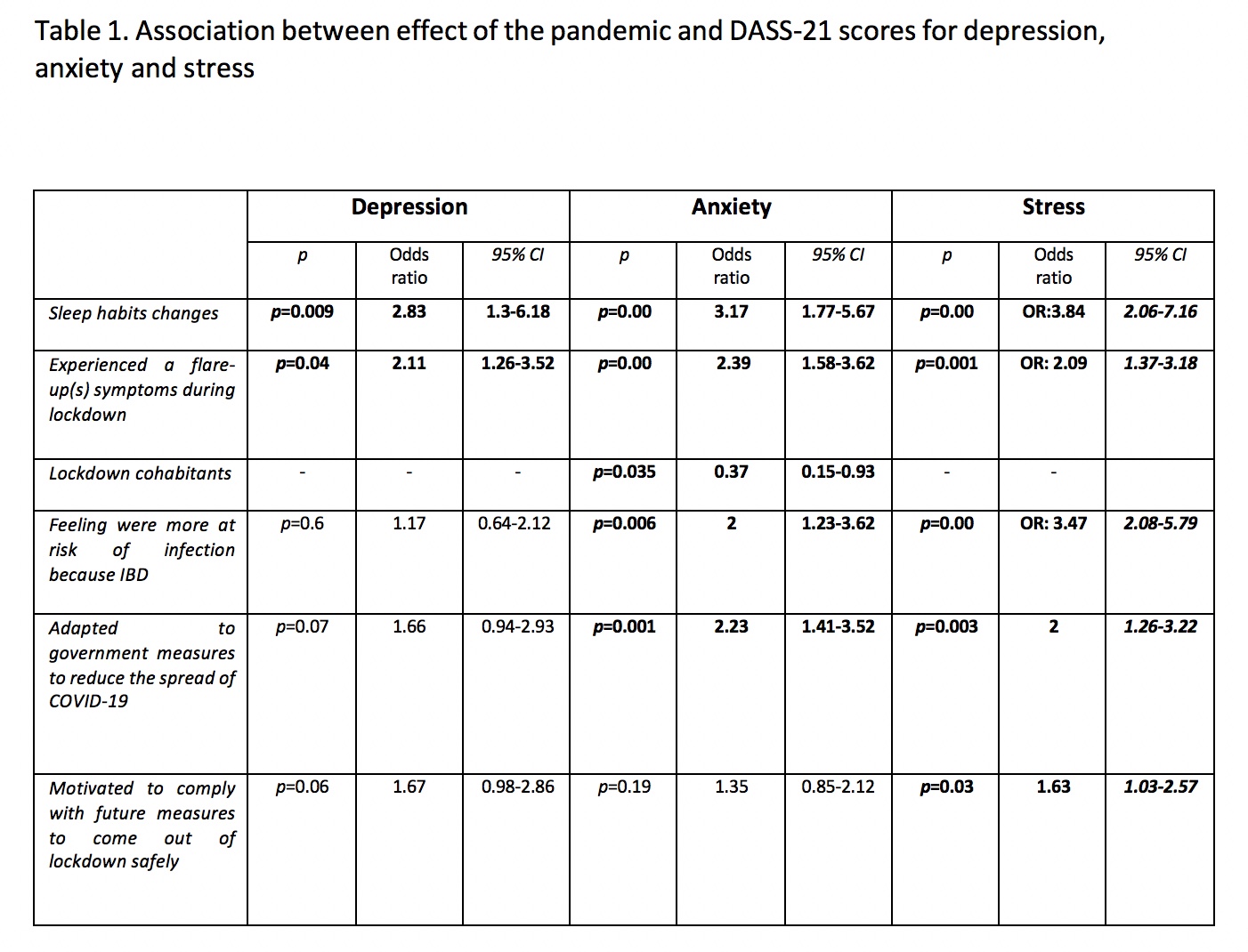P185 Psychosocial impact of the COVID-19 pandemic on patients with inflammatory bowel disease in Spain
Hernandez Camba, A.(1);Ramos, L.(2);Madrid Álvarez, M.B.(3);Pérez-Méndez, L.(4);Nos, P.(5);Hernández, V.(6);Guerra, I.(7);Jimenez, N.(8);Lorente, R.(9);Sierra-Ausín, M.(10);Ginard, D.(11);Varela, P.(12);Arranz, L.(1);Cabello Tapia, M.J.(13);Zabana, Y.(14);Barreiro, M.(15);
(1)Hospital Universitario Nuestra Señora de la Candelaria, Gastroenterology, Santa Cruz de Tenerife, Spain;(2)Hospital Universitario de Canarias, Gastroenterology, La Laguna, Spain;(3)Hospital Universitario de Gran Canaria Dr. Negrín, Dermatology Department- Research Unit, Las Palmas de Gran Canaria, Spain;(4)Hospital Universitario Nuestra Señora de la Candelaria and Networked Biomedical Research Centre CIBER of Respiratory Diseases- Carlos III Health Institute, Division of Clinical Epidemiology and Biostatistics- Research Unit, Santa Cruz de Tenerife, Spain;(5)Hospital Universitario y Politécnico de la Fe de Valencia and Center for Biomedical Research and Network in Liver and Digestive Diseases CIBERehd- Instituto de Salud Carlos III, Gastroenterology, Valencia, Spain;(6)Hospital Alvaro Cunqueiro, Gastroenterology, Vigo, Spain;(7)Hospital Universitario de Fuenlabrada and Instituto de Investigación Hospital Universitario La Paz IdiPaz, Gastroenterlogy, Madrid, Spain;(8)Hospital General Universitario de Elche, Gastroenterology, Elche, Spain;(9)Hospital General Universitario Ciudad Real, Gastroenterology, Ciudad Real, Spain;(10)Hospital Universitario de León, Gastroenterology, León, Spain;(11)Hospital Universitari Son Espases, Gastroenterology, Palma de Mallorca, Spain;(12)Hospital de Cabueñes, Gastroenterology, Gijón, Spain;(13)Hospital Universitario Virgen de Las Nieves, Gastroenterology, Granada, Spain;(14)Hospital Universitario Mútua Terrassa and Center for Biomedical Research and Network in Liver and Digestive Diseases CIBERehd- Instituto de Salud Carlos III, Gastroenterology, Barcelona, Spain;(15)Hospital Clínico Universitario de Santiago de Compostella, Gastroenterology, Santiago de Compostela, Spain; on behalf of GETECCU
Background
Few studies have examined the effects of COVID-19 on the mental health of patients with inflammatory bowel disease (IBD), who are already at higher risk of depression, anxiety and stress than the general population. This cross-sectional study was conducted to assess the psychosocial impact of COVID-19 on patients with IBD in Spain during lockdown and the first wave of the pandemic.
Methods
A self-report questionnaire that integrated the Spanish version of the Depression, Anxiety and Stress Scale–21 items (DASS-21) and the Perceived Stress Questionnaire (PSS) was designed to gather sociodemographic data and information related to the effects of COVID-19 on the lives of IBD patients. Twelve IBD units invited their patients to answer the anonymous online survey via email or by using a QR code displayed at the unit. A link to the survey was also published on the GETECCU (Spanish IBD group) website and social media account. The survey was conducted between the 1st July and the 25th August 2020.
Results
Of the 693 survey participants with IBD, 67% were female, mean age 43 (12y SD). 61% had ulcerative colitis, 36% Crohn’s disease 3% indeterminate colitis. Only 15 participants were diagnosed with COVID-19: 3 of them required hospital admission and none required ICU admission. Physical activity levels and sleep habits were adversely affected for 79% and 67% of respondents, respectively. In addition, 39% reported a decrease in income due to the pandemic. 95% report having complied with IBD treatment during the COVID-19 pandemic, despite over 50% of them feeling that they were more at risk of infection due to their medication. DASS-21 scores indicate that during the lockdown the estimated prevalence of depression was 10.5% [95% CI 8.2–13%], anxiety 20% [95% CI –17-23%] and stress 18% [95% CI 8.2–13%]. Multivariate analysis is described in table 1. 
Conclusion
In the short-term, lockdown during the COVID-19 pandemic seemed to have an impact on the mental health of our IBD patients in Spain. Further follow-up studies should be carried out to determine the real long-term impact, as it's known that the wellbeing of this population might be affected because of IBD itself.


